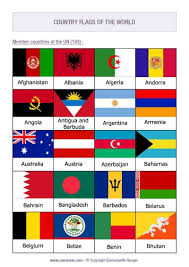Unveiling the Symbolism of Flags: A Colorful Exploration

Flags: Symbolism and Significance
Flags have been used for centuries as symbols of identity, pride, and unity. They come in various shapes, colors, and designs, each carrying its own unique meaning. From national flags that represent countries to flags used in sports events or military operations, these emblems play a significant role in our lives.
The Power of Flags
Flags are more than just pieces of cloth; they hold deep symbolic value for individuals and communities. They can evoke feelings of patriotism, nostalgia, or solidarity. The colors and symbols on a flag often reflect the history, culture, and values of the people it represents.
Types of Flags
There are different types of flags used around the world. National flags represent countries and are often displayed on government buildings, during official ceremonies, or at international events. State flags symbolize regions within a country or territories under a government’s jurisdiction.
In addition to national and state flags, there are also organizational flags used by institutions such as the United Nations or NATO. Signal flags are used in maritime communication to convey messages between ships. Sports teams also have their own flags that fans proudly wave during games.
Flag Etiquette
Respect for flags is essential in many cultures. There are specific protocols for handling and displaying flags to show proper reverence. For example, it is customary to raise national flags at sunrise and lower them at sunset as a sign of respect.
In Conclusion
Flags serve as powerful symbols that unite people under a common identity or cause. Whether they represent nations, organizations, or sports teams, flags play an important role in our society by fostering a sense of belonging and pride.
Seven Essential Tips for Understanding, Respecting, and Enjoying the World of Flags
- Study the symbolism and meaning behind different flags.
- Respect the flag of each country and avoid any disrespectful behavior towards them.
- Learn flag etiquette, such as proper ways to display and handle flags.
- Understand the history and evolution of flags to appreciate their significance.
- Recognize that flags can evoke strong emotions and pride in people.
- Be aware of any specific rules or regulations related to flag usage in different contexts.
- Consider collecting flags as a hobby to explore different cultures and histories.
Study the symbolism and meaning behind different flags.
To truly appreciate the significance of flags, it is essential to study the symbolism and meaning behind each design. By delving into the history, colors, and symbols featured on different flags, we can gain a deeper understanding of the cultural, political, and historical contexts they represent. Learning about the stories and values encapsulated in flags allows us to connect with diverse communities and appreciate the rich tapestry of identities that these emblems symbolize.
Respect the flag of each country and avoid any disrespectful behavior towards them.
It is important to respect the flag of each country and to avoid any behavior that may be considered disrespectful towards them. Flags are symbols of national identity and pride, and showing proper respect for them demonstrates courtesy and understanding towards the culture and history they represent. By honoring the flags of different nations, we can promote mutual respect and appreciation for the diversity and richness of our world.
Learn flag etiquette, such as proper ways to display and handle flags.
It is essential to familiarize yourself with flag etiquette, including the proper ways to display and handle flags. Understanding and following flag protocols demonstrate respect for the symbolism and significance that flags hold. Whether raising a national flag at sunrise or folding it ceremoniously, observing flag etiquette helps honor the values and traditions associated with these powerful symbols.
Understand the history and evolution of flags to appreciate their significance.
To truly appreciate the significance of flags, it is essential to delve into their history and evolution. Understanding how flags have evolved over time, from simple symbols to complex emblems of identity and pride, allows us to grasp the deep-rooted meanings behind these iconic symbols. By exploring the historical context in which flags were created and the cultural significance they hold for different communities, we can gain a deeper appreciation for the power and symbolism that flags carry in our world today.
Recognize that flags can evoke strong emotions and pride in people.
Flags have a remarkable ability to evoke strong emotions and pride in individuals. Whether it’s the national flag representing one’s country or a flag symbolizing a particular cause or belief, these emblems hold deep significance for many people. The sight of a flag waving in the wind can stir feelings of patriotism, nostalgia, and unity, reminding us of our shared history and values. It is important to recognize the power that flags hold in shaping identities and fostering a sense of community among diverse groups of people.
Be aware of any specific rules or regulations related to flag usage in different contexts.
It is important to be aware of any specific rules or regulations related to flag usage in different contexts. Whether you are displaying a national flag, a state flag, or an organizational flag, understanding the proper protocols for handling and displaying flags shows respect and reverence for the symbolic significance they carry. By familiarizing yourself with flag etiquette guidelines, you can ensure that you are honoring the traditions and values associated with each flag in a meaningful way.
Consider collecting flags as a hobby to explore different cultures and histories.
Consider collecting flags as a hobby to explore different cultures and histories. Flag collecting can be a fascinating way to learn about the diverse backgrounds and stories behind each flag. By studying the colors, symbols, and designs of flags from around the world, collectors can gain a deeper understanding of various cultures and their historical significance. This hobby not only allows for personal enrichment but also promotes cross-cultural appreciation and respect for the rich tapestry of our global community.